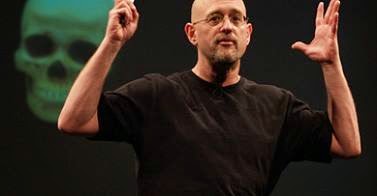"Gilbert's elbow-in-the-ribs social-science humor is actually funny. ... But underneath the goofball brilliance, he has a serious argument to make about why human beings are forever wrongly predicting what will make them happy."
~~ New York Times Book Review
Good Morning Folks,
I woke up this beautiful morning I wanted to share an inspirational Ted Talk with all of you. When you watch it you may wonder why you hadn't heard of this before, or better yet be surprised that over a million people have already watched it (between YouTube and Ted postings alone). That's the power of Ted.
Gilbert believes that, in our ardent, lifelong pursuit of happiness, most of us have the wrong map. In the same way that optical illusions fool our eyes -- and fool everyone's eyes in the same way -- Gilbert argues that our brains systematically misjudge what will make us happy. And these quirks in our cognition make humans very poor predictors of our own bliss.
The premise of his current research -- that our assumptions about what will make us happy are often wrong -- is supported with clinical research drawn from psychology and neuroscience. But his delivery is what sets him apart. His engaging -- and often hilarious -- style pokes fun at typical human behavior and invokes pop-culture references everyone can relate to. This winning style translates also to Gilbert's writing, which is lucid, approachable and laugh-out-loud funny. The immensely readable Stumbling on Happiness, published in 2006, became a New York Times bestseller and has been translated into 20 languages.
Dr. Gilbert asks us to imagine two different futures ... One, winning the lottery (yes, I like this ... I will buy a plane, and maybe an island suitable for the construction of a landing strip ... and definitely a sail boat, a small one ... I will recreate the Corona ad and learn to enjoy beer or at least ice cold limeade ... ). The other is become paraplegic. (No thanks.)
He informs us that "Happiness" data has been collected on these two different groups.
"Because the fact is that a year after losing the use of their legs, and a year after winning the lotto, lottery winners and paraplegics are equally happy with their lives."
The lesson I want to leave you with from these talk is that our longings and our worries are both to some degree overblown, because we have within us the capacity to manufacture the very commodity we seek.
What an inspiration Gilbert is to the very core and spirit of FSO's brand.
We are pumped, super excited and ready to rock.
Love Life,
Mitchell D. Weiner
Chief Happiness Officer
Ideas are not set in stone. When exposed to thoughtful people, they morph and adapt into their most potent form.TED Tuesdays on MitchWeiner.com highlights some of today's most intriguing ideas. Look for more talks on Technology, Entertainment and Design -- plus science, business, global issues, the arts and much more— HERE.











